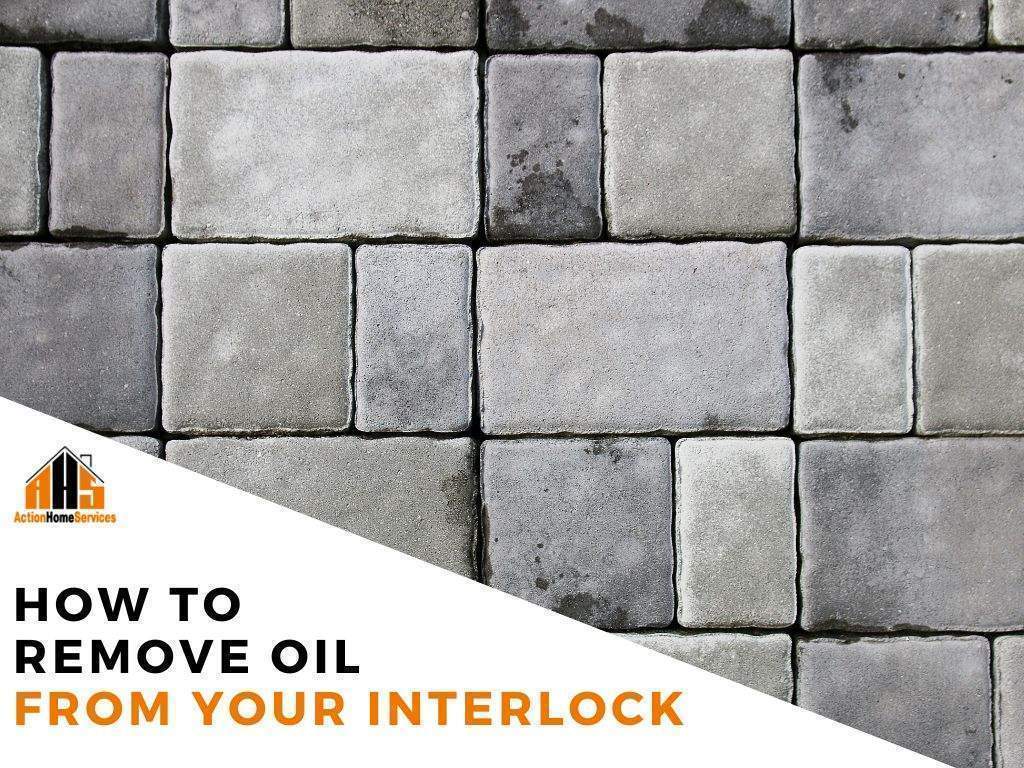
The winter will soon be over, and the snow and ice will finally melt from your interlocking paver driveway. All winter long, if you’ve even looked at your driveway, your thoughts have been about shoveling or de-icing and certainly not about the stains that may lie underneath.
But, when spring arrives, you start to look at things differently: cleaning up the garden, planting flowers, and how to get your driveway back into tip-top shape.
DIY Interlock Paver Cleaning Solutions
Routine cleaning and maintenance are critical for optimizing the lifespan and aesthetic appeal of your interlocking pavers. If there are no nasty stains, dish soap and a scrub brush may do the trick. Using a scrub brush with a long handle will save your back and make the job much easier. Dawn Detergent (but any oil-fighting detergent will do) is famous for its gentleness in cleaning the oil from contaminated shorebirds. It (when combined with elbow grease) will remove light staining and clean the salt from your driveway. Add it to some warm water in a bucket and brush it over the pavers. Then rinse thoroughly. You can also use white vinegar. Mix a 1:1 solution of vinegar with water, soak down the surface, wait an hour, spray with soap and water, brush, and rinse. It may be all that is needed.
Household detergent or vinegar may be okay for minor stains. But, if you’ve discovered more difficult stains like oil or grease, you will probably need a cleaner designed to remove this kind of stain. So, off to the hardware store you go. But beware, the first one I found got poor reviews when I searched it on Google. Hopefully, a little work on Google ahead of time will help you find designated oil and degreasing cleaning products that get stellar reviews.
One company whose products generally get good reviews is Simple Green. Their Simple Green Oxy Solve Concrete and Driveway Cleaner “removes oil, grease, grime and most stains and discolorations,” according to their website. And, its biodegradable formula makes it safer for lawns and pets. They claim the “non-corrosive and non-degrading formula utilizes the natural power of peroxide to provide high-performance cleaning and stain removal without toxic or abrasive chemicals.”
Most oil and grease-removing products are used in a similar way.
Concrete and Driveway Cleaning Process
I’ve modified Simple Green’s short how-to description (from their page linked above).
- Clean the pavers of debris. Before using any cleaning method, make sure the area is completely cleaned of debris.
- Mix your cleaning solution. Mix 1 measure of Simple Green Oxy Solve Concrete and Driveway Cleaner with 20 measures of water in a bucket (example: 1.5 cups Simple Green and 2 gallons water).
- Wet the surface to be cleaned. Use a garden hose to thoroughly wet the brick surface before cleaning.
- Apply your Simple Green solution with a scrub brush. Gently scrub with a deck brush, stiff broom or nylon-bristle brush to apply the cleaner in sections. Don't let it dry on the surface before rinsing. Don't scrub the brick with a wire brush, as this can leave bits of metal behind that will rust and stain the bricks.
- Allow each section to soak for a few minutes. Allow the cleaner to sit on the surface for 3-5 minutes.
- Rinse with clean water. Rinse with a garden hose at the highest pressure.
- Repeat. Move to a new section and repeat.
And that usually does the trick.
Whether using Simple Green’s Simple Green Oxy Solve Concrete and Driveway Cleaner or a comparable product, regularly cleaning the grease and oil from your interlocking pavers will keep your driveway looking good for years to come.
What About a Fresh Stain?
If you’ll be working on your car or motorcycle, your best bet is to place a protective covering over your pavers. Using kitty litter to absorb spilled oil or grease gets mixed reviews regarding its efficacy and safety. Baking soda can work, but you may not have enough on hand if the spill is substantial. There are pads made for absorbing up spilled oil. They may be worth the investment if you’re regularly tinkering on your vehicles.
And, if you regularly maintain and seal your interlock, the grease and oil may not have a chance to penetrate the stone if a spill does occur, but that is the topic for another post.
Give us a call if you have any questions.


